

Jewish angelic hierarchy. Book of Enoch. The older sections (mainly in the Book of the Watchers) are estimated to date from about 300 B.C., and the latest part (Book of Parables) probably was composed at the end of the first century B.C.[2] It is wholly extant only in the Ge'ez language, with Aramaic fragments from the Dead Sea Scrolls and a few Greek and Latin fragments.

For this and other reasons, the traditional Ethiopian belief is that the original language of the work was Ge'ez, whereas non-Ethiopian scholars tend to assert that it was first written in either Aramaic or Hebrew; E. Isaac suggests that the Book of Enoch, like the Book of Daniel, was composed partially in Aramaic and partially in Hebrew.[3]:6 No Hebrew version is known to have survived. The book itself claims to be written by Enoch himself before the Biblical Flood. Content[edit] The book consists of five quite distinct major sections (see each section for details): Christian angelic hierarchy. For other angelic hierarchies, see Hierarchy of angels.
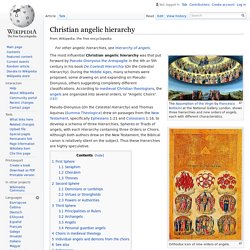
Orthodox icon of nine orders of angels. The most influential Christian angelic hierarchy was that put forward by Pseudo-Dionysius the Areopagite in the 4th or 5th century in his book De Coelesti Hierarchia (On the Celestial Hierarchy). During the Middle Ages, many schemes were proposed, some drawing on and expanding on Pseudo-Dionysius, others suggesting completely different classifications. According to medieval Christian theologians, the angels are organized into several orders, or "Angelic Choirs".[1][2] Pseudo-Dionysius (On the Celestial Hierarchy) and Thomas Aquinas (Summa Theologica) drew on passages from the New Testament, specifically Ephesians 1:21 and Colossians 1:16, to develop a schema of three Hierarchies, Spheres or Triads of angels, with each Hierarchy containing three Orders or Choirs.
Ophan. Watcher (angel) Grigory or Grigori is a Russian masculine given name Grigory/Grigori may also refer to: Grigory[edit] Grigori[edit] Grigori is a masculine given name, and may refer to: Grigori Rasputin (1869-1916), a Russian mysticGrigory Zinoviev (1883-1936), a Bolshevik revolutionary and Soviet politicianGrigori Chukhrai (1921-2001), Russian screenwriter and directorGrigori Galitsin (b. 1957), Russian erotic photographer and porn directorGrigori Fyodorovich Grinko (1890-1938), Soviet statesman and finance ministerGrigori Kozintsev (1905-1973), Soviet Russian film directorGrigori Yermovich Kromanov (1926–1984), Estonian theatre and film directorGrigori Ivanovitch Langsdorff (1774-1852), Prussian aristocrat, politician and naturalistGrigori Marchenko (b. 1946), Honorary Consul of the Singaporean government to the Kazakh governmentGrigori Nelyubov (1934–1966), Russian cosmonautGrigori Panteleimonov (1883-?)

Fictional characters and artistic works[edit] Death (personification) A Western depiction of Death as a skeleton carrying a scythe In some cases, the Grim Reaper can actually cause the victim's death,[2] leading to tales that he can be bribed, tricked, or outwitted in order to retain one's life, such as in the case of Sisyphus.
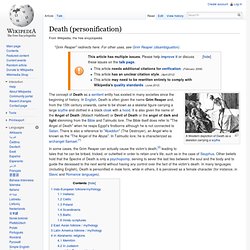
Other beliefs hold that the Spectre of Death is only a psychopomp, serving to sever the last ties between the soul and the body and to guide the deceased to the next world without having any control over the fact of the victim's death. In many languages (including English), Death is personified in male form, while in others, it is perceived as a female character (for instance, in Slavic and Romance languages). Breton folklore shows us a spectral figure portending death, the Ankou. Usually, the Ankou is the spirit of the last person that died within the community and appears as a tall, haggard figure with a wide hat and long white hair or a skeleton with a revolving head who sees everyone, everywhere. Belial. A woodcarving of Belial and some of his followers from Jacobus de Teramo's book Buche Belial (1473).
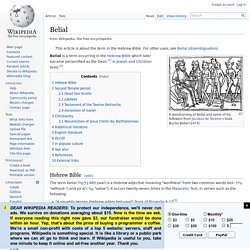
Belial is a term occurring in the Hebrew Bible which later became personified as the Devil [1] in Jewish and Christian texts.[2] Hebrew Bible[edit] The term belial (בְלִיַּעַל bĕli-yaal) is a Hebrew adjective meaning "worthless" from two common words beli- (בְּלִי "without-") and ya'al ( יָעַל "value"). Michael (archangel)
Michael ("who is like God?
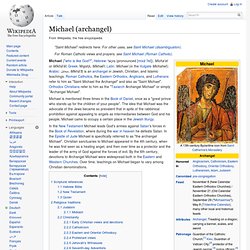
", Hebrew: מִיכָאֵל (pronounced [mixåˈʔel]), Micha'el or Mîkhā'ēl; Greek: Μιχαήλ, Mikhaḗl; Latin: Michael (in the Vulgate Michahel); Arabic: ميخائيل, Mīkhā'īl) is an archangel in Jewish, Christian, and Islamic teachings. Roman Catholics, the Eastern Orthodox, Anglicans, and Lutherans refer to him as "Saint Michael the Archangel" and also as "Saint Michael". Orthodox Christians refer to him as the "Taxiarch Archangel Michael" or simply "Archangel Michael".
Gabriel. In Abrahamic religions, Gabriel (Hebrew: גַּבְרִיאֵל, Modern Gavri'el Tiberian Gaḇrîʼēl, God is my strength; Arabic: جبريل, Jibrīl or جبرائيل Jibrāʾīl) is an angel who typically serves as a messenger sent from God to certain people.
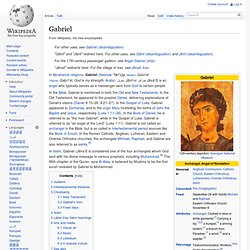
In Islam, Gabriel (Jibra'il) is considered one of the four archangels whom God sent with his divine message to various prophets, including Muhammad.[6] The 96th chapter of the Quran, sura Al-Alaq, is believed by Muslims to be the first surah revealed by Gabriel to Muhammad. Lucifer.
Lucifer (/ˈluːsɪfər/ or /ˈljuːsɪfər/) is the King James Version rendering of the Hebrew word הֵילֵל in Isaiah 14:12.[1] This word, transliterated hêlêl[1] or heylel,[2] occurs only once in the Hebrew Bible[1] and according to the KJV-influenced Strong's Concordance means "shining one, morning star, Lucifer".[2] The word Lucifer is taken from the Latin Vulgate,[3] which translates הֵילֵל as lucifer,[Isa 14:12][4][5] meaning "the morning star, the planet Venus", or, as an adjective, "light-bringing".[6] The Septuagint renders הֵילֵל in Greek as ἑωσφόρος[7][8][9][10][11] (heōsphoros),[12][13][14] a name, literally "bringer of dawn", for the morning star.[15] In this passage Isaiah applies to a king of Babylon the image of the morning star fallen from the sky, an image he is generally believed to have borrowed from a legend in Canaanite mythology.[16] Etymology, Lucifer or morning star[edit] "How you have fallen from heaven, morning star, son of the dawn!
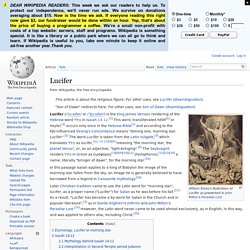
J. Raphael (archangel)